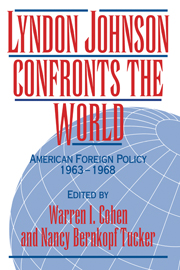Book contents
- Frontmatter
- Contents
- Dedication
- Acknowledgments
- List of Contributors
- Introduction
- 1 Lyndon B. Johnson: Change and Continuity
- 2 Johnson, Vietnam, and Tocqueville
- 3 “A Time in the Tide of Men's Affairs”: Lyndon Johnson and Vietnam
- 4 Threats, Opportunities, and Frustrations in East Asia
- 5 Toward Disillusionment and Disengagement in South Asia
- 6 Lyndon B. Johnson, Germany, and “the End of the Cold War”
- 7 The Promise of Progress: U.S. Relations with Latin America During the Administration of Lyndon B. Johnson
- 8 Keeping Africa off the Agenda
- 9 Balancing American Interests in the Middle East: Lyndon Baines Johnson vs. Gamal Abdul Nasser
- 10 Lyndon Johnson: A Final Reckoning
- Suggestions for Further Reading
- Index
10 - Lyndon Johnson: A Final Reckoning
Published online by Cambridge University Press: 05 June 2012
- Frontmatter
- Contents
- Dedication
- Acknowledgments
- List of Contributors
- Introduction
- 1 Lyndon B. Johnson: Change and Continuity
- 2 Johnson, Vietnam, and Tocqueville
- 3 “A Time in the Tide of Men's Affairs”: Lyndon Johnson and Vietnam
- 4 Threats, Opportunities, and Frustrations in East Asia
- 5 Toward Disillusionment and Disengagement in South Asia
- 6 Lyndon B. Johnson, Germany, and “the End of the Cold War”
- 7 The Promise of Progress: U.S. Relations with Latin America During the Administration of Lyndon B. Johnson
- 8 Keeping Africa off the Agenda
- 9 Balancing American Interests in the Middle East: Lyndon Baines Johnson vs. Gamal Abdul Nasser
- 10 Lyndon Johnson: A Final Reckoning
- Suggestions for Further Reading
- Index
Summary
In contrast to histories written about presidents such as John F. Kennedy and Dwight D. Eisenhower, this volume assessing LBJ and his administration has not tried to tell the reader that there abided a different man behind the brash, crude, often insensitive exterior that the public knew as Lyndon Johnson. In fact, the president was vulgar, demanding, vain, and combative, if also brilliant, determined, and filled with what seemed to be inextinguishable energy. He proved to be dominated by the Cold War stereotypes of his time, filled with the conviction that the world could be transformed through judicious applications of Franklin Roosevelt's New Deal thinking, and committed to fulfillment of some of the most assertive portions of the Kennedy legacy. Indeed, as much as those who fashioned the Kennedy legend would have hated the comparison, Lyndon Johnson proved remarkably like JFK in his pragmatism, dedication to nation building, concern about credibility, discomfort with revolutionary change, and arrogant assumption that American interpretations of democracy and development provided appropriate models for all nations. Where he differed, ironically, may have been in displaying a greater degree of prudence than Kennedy's youth, boldness, and activism could tolerate. Johnson really was the man he seemed to be, really did lose his way in the jungles of Vietnam, and, in the end, really could not perceive why his vision for a Great Society in America and for American leadership in the world had gone astray.
- Type
- Chapter
- Information
- Lyndon Johnson Confronts the WorldAmerican Foreign Policy 1963–1968, pp. 311 - 320Publisher: Cambridge University PressPrint publication year: 1995
- 1
- Cited by

